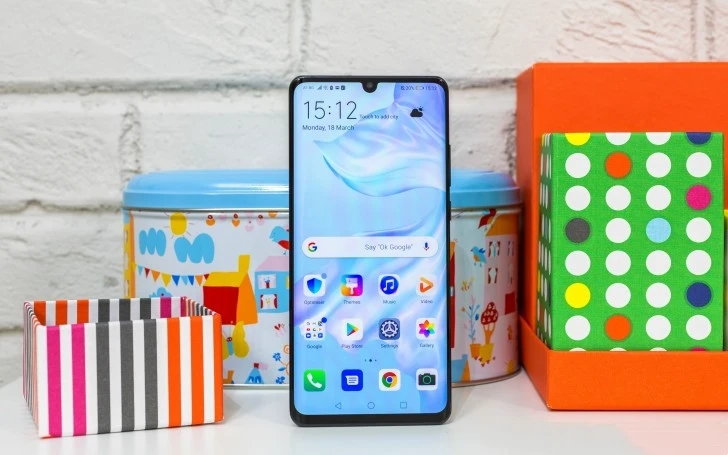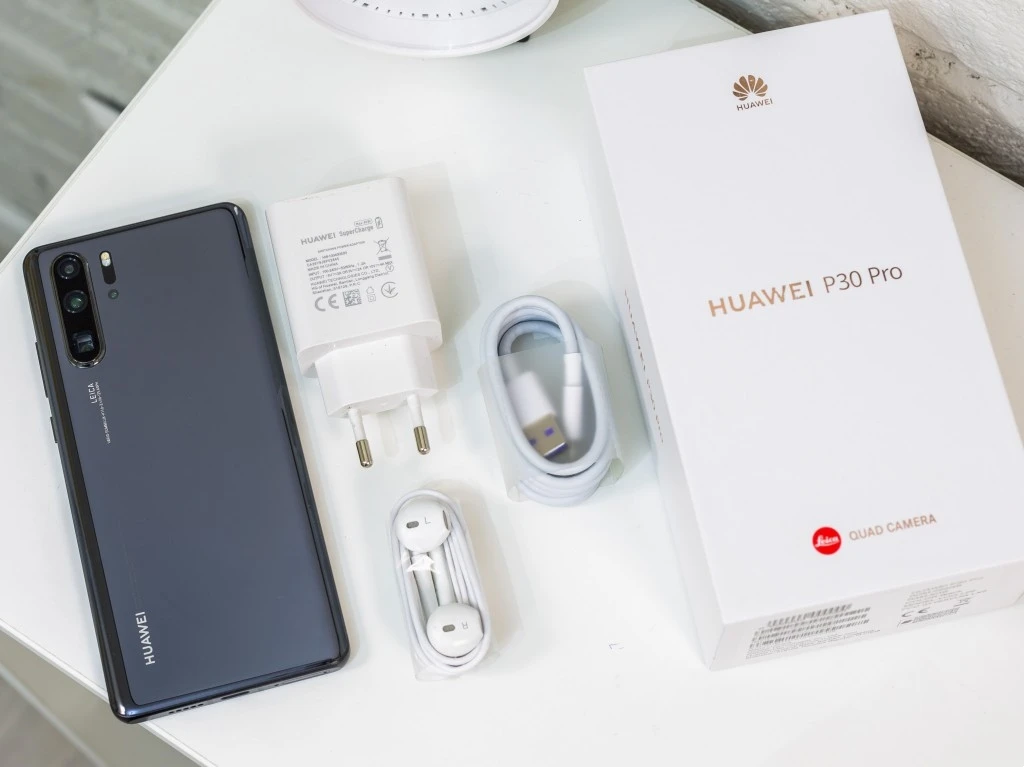NETWORK |
||
GSM 850 / 900 / 1800 / 1900 - SIM 1 & SIM 2 (dual-SIM model only) |
||
HSDPA 800 / 850 / 900 / 1700(AWS) / 1900 / 2100 |
||
HSDPA 850 / 900 / 1700(AWS) / 1900 / 2100 |
||
1, 2, 3, 4, 5, 6, 7, 8, 9, 12, 17, 18, 19, 20, 26, 28, 32, 34, 38, 39, 40 |
||
1, 2, 3, 4, 5, 6, 7, 8, 9, 12, 17, 18, 19, 20, 26, 28, 34, 38, 39, 40, 66 |
||
HSPA 42.2/5.76 Mbps, LTE-A Cat21 1400/200 Mbps |
BODY |
158 x 73.4 x 8.4 mm (6.22 x 2.89 x 0.33 in) |
|
192 g (6.77 oz) |
||
Glass front (Aluminosilicate glass), glass back (Aluminosilicate glass), aluminum frame |
||
Single SIM (Nano-SIM) or Hybrid Dual SIM (Nano-SIM, dual stand-by) |
||
IP68 dust/water resistant (up to 2m for 30 min) |
DISPLAY |
OLED, HDR10 |
|
6.47 inches, 102.8 cm2 (~88.6% screen-to-body ratio) |
||
1080 x 2340 pixels, 19.5:9 ratio (~398 ppi density) |
PLATFORM |
Android 9.0 (Pie), upgradable to Android 10, EMUI 10 |
|
Kirin 980 (7 nm) |
||
Octa-core (2x2.6 GHz Cortex-A76 & 2x1.92 GHz Cortex-A76 & 4x1.8 GHz Cortex-A55) |
||
Mali-G76 MP10 |
MEMORY |
NM (Nano Memory), up to 256GB (uses shared SIM slot) |
|
128GB 6GB RAM, 128GB 8GB RAM, 256GB 8GB RAM, 512GB 8GB RAM |
||
UFS 2.1 |
MAIN CAMERA |
40 MP, f/1.6, 27mm (wide), 1/1.7", PDAF, OIS |
|
Leica optics, dual-LED dual-tone flash, panorama, HDR |
||
4K@30fps, 1080p@60fps, 1080p@30fps (gyro-EIS), 720p@960fps |
SELFIE CAMERA |
32 MP, f/2.0, 26mm (wide), 1/2.8", 0.8µm |
|
HDR |
||
1080p@30fps |
SOUND |
Yes |
|
No |
||
32-bit/384kHz audio |
COMMS |
Wi-Fi 802.11 a/b/g/n/ac, dual-band, Wi-Fi Direct |
|
5.0, A2DP, aptX HD, LE |
||
GPS (L1+L5), GLONASS (L1), BDS (B1), GALILEO (E1+E5a), QZSS (L1+L5) |
||
Yes |
||
Yes |
||
No |
||
USB Type-C 3.1 |
FEATURES |
Fingerprint (under display, optical), accelerometer, gyro, proximity, compass, color spectrum |
BATTERY |
Li-Po 4200 mAh, non-removable |
|
40W wired, 70% in 30 min (advertised) |
Introduction
Huawei has completely blurred the lines between its signature Mate and P series by raising the bar higher and higher every six months. And it has done it yet again with the Huawei P30 Pro - now with an even larger AMOLED screen and a brand-new quad-camera setup that aims to become the new benchmark for the whole industry.

Just as expected the next smartphone Leica camera premieres on the Huawei P30 Pro and now it's a quad-setup. But Huawei hasn't just added a ToF sensor and call it a day. Instead, the maker made upgrades across the board - the main snapper has a new 40MP sensor by Sony with improved low-light performance and optical stabilization.
Then Huawei has upped its own game and has introduced an innovative periscopic lens to achieve 5x optical zoom on its 8MP tele camera. The so-called hybrid zoom is available and it's now 10x, with an option to go as high as 50x - all purely digital, of course.

The third camera is borrowed straight from the Mate 20 Pro - a 20MP snapper with 16mm ultra-wide lens and autofocus.
The fourth and final camera is the aforementioned ToF unit, which promises to take the portrait shots up another notch.
The selfie fans aren't forgotten - the front camera is now a 32MP one, with AI HDR+ and improved portraits.

The selfie snapper occupies the tiny notch on the new 6.47" AMOLED screen. The panel itself sticks to 1080p resolution and has an under-display fingerprint scanner at the bottom, and also doubles as an earpiece. That's right, the whole thing is now "acoustic" and vibrates to create sound and thus there is no need for an actual earpiece.
Other niceties coming straight from the Mate 20 Pro are the 40W Super Charging and 15W wireless charging support, as well as the reverse wireless charging.
Huawei P30 Pro specs
Body: dual-glass with metal frame; IP68-rated for dust and water resistance
Screen: 6.47" AMOLED, 1,080 x 2,340 px resolution (398ppi); tiny notch; acoustic display
Chipset: Kirin 980 chipset, octa-core processor (2xA76 @2.6GHz + 2xA76 @1.92GHz +4xA55 @1.8GHz), Mali-G76 MP10 GPU, graphene film and heat pipe with vapor chamber cooling system
Memory: 6/8GB RAM, 128/256/512GB storage (expandable via Nano Memory - hybrid slot)
OS: Android 9 Pie with EMUI 9.1;
Camera: 40MP f/1.6 OIS (RYYB filter) + 8MP with periscope 135mm f/3.4 OIS lens (5x optical zoom) + 20MP f/2.2 ultra-wide (16mm) + ToF camera; 4K video capture, 720@960fps slow-mo, Leica branding
Camera features: 1/1.7" 40MP sensor, up to ISO 204,800, 5x optical zoom, 10x hybrid zoom, 50x digital zoom, Super Macro Mode, OIS + EIS, Variable Aperture, Portrait Mode, Night Mode
Selfie cam: 32MP, f/2.0 Leica lens, Portrait Mode with live bokeh effects
Battery: 4,200mAh; Super Charge 40W; 15W wireless charging; reverse wireless charging
Security: Fingerprint reader (under display)
Connectivity: Dual SIM, Wi-Fi a/b/g/n/ac, Dual-band GPS; Bluetooth 5 + LE, NFC, USB Type-C
Misc: IR blaster, acoustic display acts as earpiece, bottom-firing loudspeaker
NETWORK |
||
GSM 850 / 900 / 1800 / 1900 - SIM 1 & SIM 2 (dual-SIM model only) |
||
HSDPA 800 / 850 / 900 / 1700(AWS) / 1900 / 2100 |
||
HSDPA 850 / 900 / 1700(AWS) / 1900 / 2100 |
||
1, 2, 3, 4, 5, 6, 7, 8, 9, 12, 17, 18, 19, 20, 26, 28, 32, 34, 38, 39, 40 |
||
1, 2, 3, 4, 5, 6, 7, 8, 9, 12, 17, 18, 19, 20, 26, 28, 34, 38, 39, 40, 66 |
||
HSPA 42.2/5.76 Mbps, LTE-A Cat21 1400/200 Mbps |
The other good news is the P30 Pro is IP68-rated for dust and water resistance.
Just like the Mate 20 series, the P30 lineup adopts the smaller proprietary NM card expansion option with all the positives and negatives that entails.
Finally, the P30 Pro boots the latest EMUI 9.1 based on Android Pie. The phone uses Huawei's new EROFS file system though, which should offer much better read speeds. But before we dig into all those details and technicalities, let's pop this P30 Pro out of its box.
Unboxing the Huawei P30 Pro
The Huawei P30 Pro is packed in a mid-sized paper box with a 40W charger, an enhanced USB-C cable that works with Super Charge, and an EarPods-like headset. Some markets will also get a protective case.

Huawei P30 Pro official images




Huawei P30 Pro - our photos




























